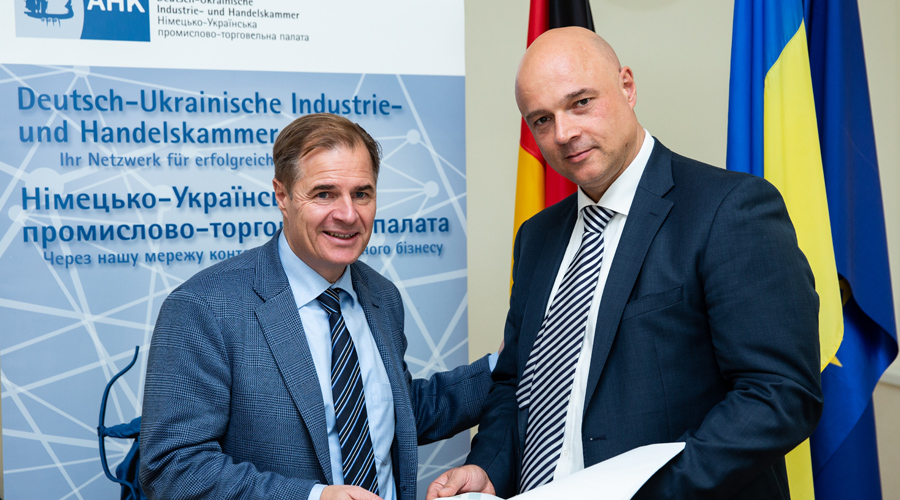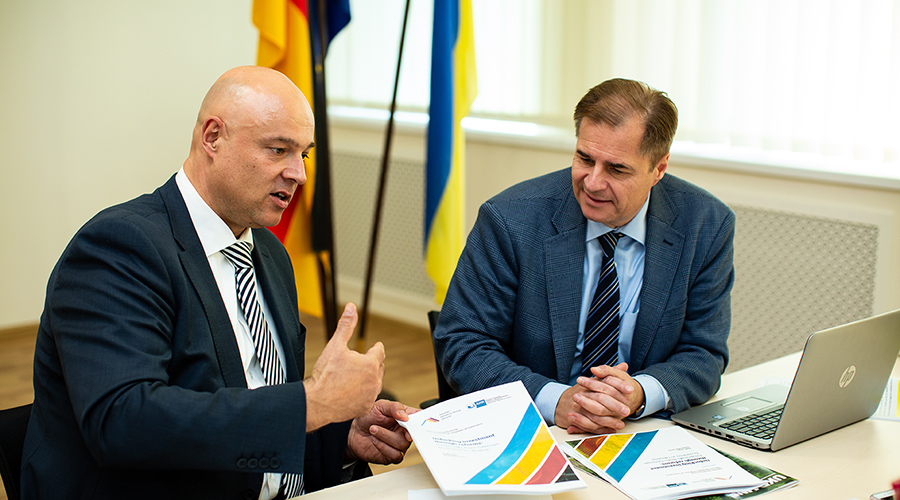
The German-Ukrainian Chamber of Industry & Commerce officially opened in Kiev in October 2016 after 23 years of business cooperation prior to that date. The chamber provides practical support for around 2,000 German companies established in Ukraine, and promotes bilateral trade by encouraging business contacts to create trust. But as AHK Ukraine President Andreas Lier and its CEO and Head of Country Cluster East Europe/Managing Director of BASF in Ukraine, Alexander Markus explain, the chamber is also trying to contribute to the loftier goal of bringing the country up to its full potential as a developed economy with an educated workforce, a major exporter of goods and services, and, perhaps above all, as an agricultural powerhouse that could one day feed a world with dwindling land supplies and a growing population
How did Germany’s business delegation in Ukraine evolve into what it is today?
Alexander Markus: Our team has been working in Ukraine for the last 25 years. Before the chamber was established in 2016, there was the Delegation of German Industry and Commerce that opened in 1993. In 2016, this delegation was transformed into a full-fledged chamber that is a member of the worldwide AHK-network – German Chambers of Commerce Abroad. We are worldwide 20 percent co-financed by the Federal Ministry of Economy and Energy, so for every single euro that we receive, we earn an additional four euros. Our mission is the promotion of German-Ukrainian economic cooperation, and that is what we have been doing for the last quarter of a century.
What are some of your achievements?
A.M: We have around 2,000 active German companies represented in Ukraine. We have been providing them with support throughout the years, and even during the crisis of 2013 to 2015, very few businesses left Ukraine. German exports declined by 33 percent in 2014, which is significant, but since 2016 we are seeing double-digit export growth, and businesses see that it was a wise decision to stay. In 2017 many German companies experienced their best year in their entire history in Ukraine, and figures for this year are strong too.
Germany is Ukraine’s largest trading partner after Russia and the EU as a whole. How significant is the relationship in figures?
A.M: German statistics reported $7.6 billion (€6.6 billion) worth of exchange of goods last year, and it is even higher if you take services into account. That figure represented a 23 percent growth rate, partly reflecting the recovery from the previous crisis years. Ukrainian exports into Germany have grown 25 percent last year and 20 percent in the first eight months of 2018. And German companies provide 60,000 jobs for Ukrainians – in the automotive component production cluster alone we have 30,000 people.
What are the main sectors in which you are seeing potential for increased FDI?
Andreas Lier: The Ukrainian business model has been shifting in the last four years. Since 2014, it has been less reliant on heavy industry and gas prices, and more on light industry. We might witness a similar development as in Poland, Hungary and Slovakia, where light industry and food processing gained relevance. Ukraine is already a major manufacturer of refrigerated equipment for retail and could further expand that sector. Furniture and furnishings could also be a big potential market. Business process outsourcing is also becoming very dynamic. Finally, the food industry has really tremendous potential.
Just how much potential do you see in the food industry?
A.L: Ukraine has approximately 30 percent of the world’s fertile black soil (chernozem), and, if fully developed, Ukraine could feed one billion people. If you consider that the world is growing each year by 80 million people and losing arable land equivalent to the size of Mexico, in the next 20 years the black earth here will be extremely valuable. And Ukraine could really become a food powerhouse if it became a maker of sophisticated food products, which requires complying with the EU’s 17,000 food regulations. Right now, only around 100 companies can export according to these standards.
How can Ukrainian companies bring themselves in line with these standards?
A.L: Ukraine needs to modernize its equipment, its machinery and its technology across almost all sectors. It also needs to make high-quality, secure products that are up to EU standards. Ukraine is now starting to export to other areas like Africa and China as well, and that means they need to harmonize their standards to the requirements of global markets. Germany is helping Ukrainian manufacturers get up to speed on this subject. And the AHK, jointly with German companies, is very active in teaching Ukrainian producers how to be successful in EU markets.
What makes Ukraine a good place to invest?
A.L: Ukraine is a very attractive manufacturing location, with a highly educated and highly motivated workforce that really wants to see their country succeed. More FDI is necessary to bring the GDP to a new level; 3.6 percent is good, but this country needs real GDP growth of 7-9 percent. The potential for collaboration is huge. However, competition is increasing, and other countries are looking closely at Ukraine, including China. Within the EU, German companies still have an edge.
How can Ukrainian companies become more export-oriented?
A.M: You have to break the mental barrier. Often, we hear from Ukrainian businesspeople phrases like: “But nobody is expecting us there.” But that is not true. If you have a competitive product at a good price, it will be very attractive to foreign markets. The next issue to work on is marketing. They have an overall brand and export strategy, but they need a more precise export brand because right now Ukraine is focusing more on investment promotion.
What can the AHK do to make the brand more competitive and increase opportunities for business cooperation?
A.M: Personal contact between German and Ukrainian companies is very important. There is still not enough of that. At a foodstuff fair in Cologne in 2017, I saw 35 Ukrainian companies there, which is good, but still very low compared with the delegations from France or Italy. Ukraine must do a lot more to go abroad and reach out to the outside world. We are organizing business forums to provide opportunities for face-to-face meetings because the most important thing here is trust.

What are some success stories of collaboration between Ukrainian and German businesses?
A.M: What the partnership has created is a big success story as a whole. It would not be fair to mention just one or two names. German businesses are making close connections with their partners, and working together on modernization, sustainability, speed, innovation and creativity. Many German companies are also engaged in social responsibility projects and educational programs and see it both as an opportunity and an obligation – and even as an investment that will pay off in the future. Big German companies like Siemens or Bayer are here and they are committed.
What has been the role of the country’s reforms in encouraging this business climate?
A.M: In 2012 the country was ranked 153rd in the World Bank’s Doing Business ratings, and now it is in 71st place. There is still some way to go, but there has been amazing change here. There have been more reforms in the last four years than in the previous 20 years combined. And the most impressive change is the openness in a country that was relatively corrupt. This openness gives investors opportunities to protest if something goes wrong. The government’s ears are open and it listens to our suggestions and recommendations. There has been significant deregulation, and inspections and regulations have been scaled down. We have seen tax reforms and privatizations, and decentralization is one of the biggest success stories in this country. The free trade agreement with the EU (DCFTA) has also created a feeling of free movement of goods and a more cosmopolitan society thanks to visa-free travel to and from the EU. We are seeing more low-cost flights, and an increase in tourism. When you go to the regions you can really feel the ‘winds of change’ blowing.
What are some of the remaining problems for potential investors?
A.M: The biggest issues are compliance, red tape and bribery. With regard to this latter point, we always say to newly arriving companies: “just don’t do it.” Be clean and transparent, and everything will run smoothly. We are a role model and I think they understand this. If there are any problems, companies can turn to the AHK, and we will convey the message to the authorities, which are supportive. But there is a lot of work to do at the judiciary level and the education system. And the banking sector also needs work, as we are still seeing interest rates of 20 percent; lower rates would encourage local people here to take out credits to drive entrepreneurship.
How is your chamber supporting educational programs in Ukraine?
A.M: The trouble is that the low salaries are pushing workers to seek jobs abroad, creating a brain drain. You have to give young people the hope that they have a future right here. As a German Chamber of Industry and Commerce, we want to support the creation of vocational schools, and show people their advantages. For now, higher education still has a better image in Ukraine, so we have to show parents that a child can still develop a meaningful career with this other kind of training.
How do you see Ukraine developing in the near future?
A.M: We have official GDP growth of 3.6 percent, but much of the economy is underground and I would say that real GDP growth is probably more like 5-6 percent. A lot of how the story continues depends on the IMF; the current agreement is coming to an end, but it had already be announced that there will be another one in place. Next year there will be elections, but Ukraine’s roadmap is already defined and it is headed towards greater integration with Europe. The framework is good and this country is on a good path, especially if you consider what situation they are coming from.
Would you say that Germans in general have an erroneous image of Ukraine?
A.M: They think this place is not at all the way. Their ideas have been conditioned by media coverage, especially of the war. Outsiders think this is a dangerous place. It is actually a very good place to live. We are talking about a population of 42 million people living in Europe’s biggest country in geographical terms. Ukraine deserves to be acknowledged by the international community, and it needs to find its place in the business community. We all have an obligation to bring this country up to its full potential, which includes playing a leading role in mitigating the effects of food scarcity in the future. We are doing what we can towards this goal. This is a great place to be, and companies should come and take a look for themselves.